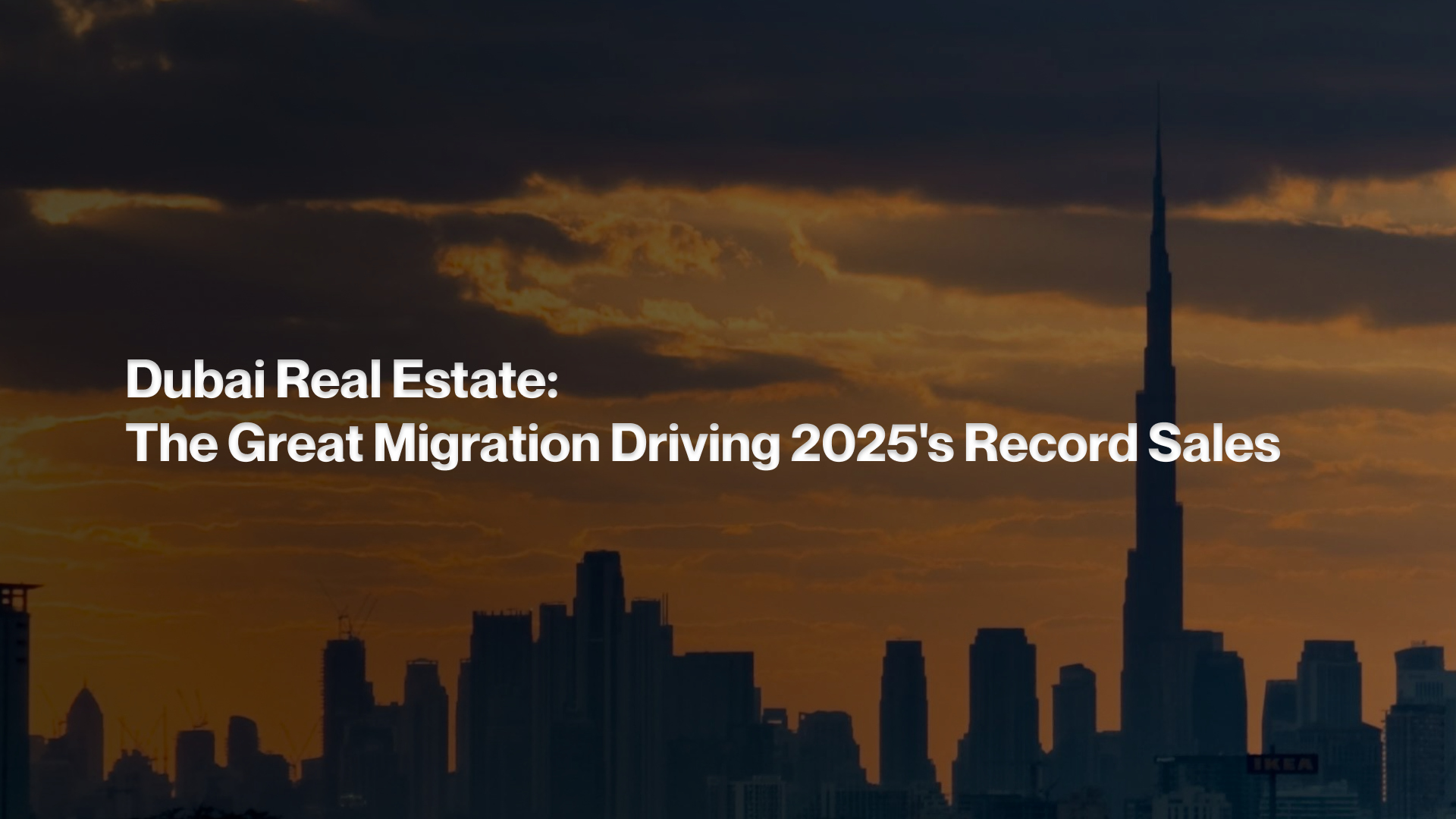
Dubai's real estate market is making headlines again—but not for the reasons you might expect. With AED 431 billion in transactions across 125,538 deals in the first half of 2025 alone, up 26% year-on-year, the emirate is experiencing unprecedented demand. Yet this isn't your typical speculative bubble. It's something far more substantial: a structural shift in global wealth migration.
The Numbers That Tell the Story
The data paints a clear picture of sustained momentum:
-
Record-Breaking Activity: Dubai's property market has shattered previous records, with luxury sales at the $10 million-plus level reaching $2.6 billion in Q2 2025—the highest on record, according to Knight Frank.
- Population Surge: Dubai's population stands at nearly 4 million (3,999,247 as of August 26, 2025), creating genuine end-user demand that extends far beyond speculative investment.
- Global Wealth Magnet: The UAE is projected to lead the world in millionaire migration for 2025, with a net inflow of approximately 9,800 high-net-worth individuals.
What makes this cycle different is that the demand isn't coming from hot money or speculative flipping. It's being driven by fundamental policy changes in major Western economies that are literally pushing wealthy individuals and businesses toward Dubai.
The Great Western Push: Why the UK and Australia Are Losing Their Appeal
United Kingdom: The End of an Era
The UK's attraction as a haven for international wealth is rapidly diminishing. The abolition of the non-domiciled tax status from April 6, 2025, marks the end of a decades-old system that allowed wealthy foreigners to avoid UK tax on overseas income. This isn't just a minor tweak—it's a seismic shift that affects the fundamental economics of living in Britain for globally mobile individuals. Adding to the pressure, the UK has raised its Skilled Worker visa salary threshold to £41,700, making it more expensive for companies to hire international talent. Meanwhile, restrictions on student visas and ongoing debates about taxing high-value primary residences create an atmosphere of uncertainty that's pushing capital elsewhere.
Australia: The Compliance Burden Grows
Australia hasn't been standing still either. Foreign property investors now face tripled application fees and doubled vacancy fees—direct cost increases that hit the bottom line immediately. The proposed "Division 296" tax on superannuation balances exceeding A$3 million, coupled with mandatory climate disclosure requirements for large entities, adds layers of complexity and cost. For globally mobile professionals and investors, both jurisdictions now present a less attractive value proposition. The question isn't whether they'll leave—it's where they'll go.
Dubai's Strategic Response: Making Relocation Irresistible
Dubai hasn't just been a passive beneficiary of Western policy missteps. The emirate has actively constructed a framework designed to convert interested parties into long-term residents:
-
The Golden Visa Program: Property investors spending AED 2 million or more qualify for a 10-year renewable visa, complete with family sponsorship rights. This isn't just about buying property—it's about building a life.
-
Tax Transparency: With no personal income tax and clear, stable policies, Dubai offers the predictability that's increasingly rare in Western jurisdictions.
- Business-Friendly Environment: From company formation to banking, Dubai has streamlined processes that make it genuinely easier to relocate entire operations, not just investment capital.
What This Means for Dubai Marina
Dubai Marina, as one of the emirate's premier waterfront communities, sits at the epicenter of this migration trend. The area combines luxury living with practical benefits that appeal to the new wave of residents:
-
Lifestyle Integration: The Marina offers the walkability, transit connections, and amenities that relocated professionals expect. It's not just a place to park money—it's a place to live.
-
Residency Pathway: Properties meeting the AED 2 million threshold provide direct access to long-term residency, making real estate purchases strategic rather than speculative.
- Liquidity and Quality: With established rental markets and a strong resale history, Marina properties offer the combination of lifestyle and investment security that appeals to long-term residents.
Addressing the Bubble Concerns
Critics point to rapid price appreciation and warn of an inevitable correction. Fitch Ratings has suggested a potential 10-15% moderation as new supply comes online. But this perspective may miss the fundamental difference between speculative bubbles and structural demand shifts.
Traditional bubbles are characterized by:
-
Short-term speculation
-
Leverage-driven purchases
-
Detachment from underlying fundamentals
-
Thin markets with limited real demand
The 2025 Dubai cycle shows different characteristics:
-
Long-term residency decisions
-
Cash-rich international buyers
-
Population growth supporting demand
- Deep, liquid markets with genuine end-user absorption
The Investment Implications
For potential buyers, this environment presents both opportunities and considerations:
-
Timing Considerations: While some moderation may occur as supply increases, the underlying demand drivers—population growth and international migration—remain strong.
-
Quality Matters: In any market cycle, the best assets in the best locations tend to outperform. In the Marina, this means focusing on properties with strong fundamentals: good views, established communities, and proven rental demand.
-
Residency Value: For international buyers, the Golden Visa eligibility adds a layer of value that goes beyond pure investment returns. When property purchase secures long-term residency rights, the calculation changes fundamentally.
Looking Forward: A New Normal
Dubai's 2025 property boom represents more than just another hot market—it reflects a fundamental rebalancing of global wealth flows. As Western economies add friction for international capital and talent, Dubai has positioned itself as the obvious alternative. The emirate's challenge now is managing this success sustainably. With record transaction volumes and continuing population growth, the key will be maintaining the policy stability and infrastructure development that attracted this wave of migration in the first place. For investors and residents alike, Dubai's story in 2025 isn't about speculation or bubbles—it's about a city that has successfully positioned itself at the center of a global shift in where wealthy individuals choose to live, work, and invest.
Navigating a market driven by structural change requires a partner with deep expertise. Contact the specialists at fäm Properties today to discuss your investment goals and capitalize on Dubai’s strategic position as the new center for global wealth.